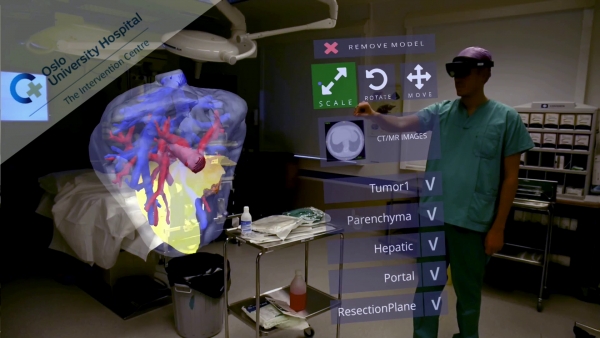Today, technology and medicine increasingly go hand in hand. An example of this is the Hipernav project, a study financed with European funds in which the UCO participated along with nine other institutions and four companies, and whose objective was to improve the precision of liver cancer surgeries.
According to the project's principal investigator at the UCO, Joaquín Olivares, this was possible thanks to the implementation of a technology that has been pioneering in the clinical field: the Hololens head-mounted display, designed by Microsoft, serves to virtually project the liver and study how to carry out the operation with greater precision.
Although the operation is not carried out with the device on, all the information appears on screens in the operating room, which can be checked during the procedure, and the instruments have sensors that guide the medical personnel. "Much progress has been made on Virtual Reality devices, and graphics and fluidity have been improved," explained Professor Olivares.
The results in this field mean that ever greater safety margins are being obtained on tumour resections because "this surgery is less invasive". Before, through open surgery, the researcher explained, "it was necessary to remove much more of the organ with cancer, but now, thanks to projects such as Hipernav, precision has been further refined".
Although the project focused on liver cancer, according to Olivares, the results could be applied to other tumours of the viscera, such as pancreatic or lung cancer. "The techniques that surgeons use are very similar when dealing with soft tissues. Therefore, any advance with the liver could be used to treat similar ones as well."
In this regard the progress made during the study is now a reality. One of the partners, the company CAScination AG, is already incorporating part of Hipernav's technology. In addition, in Switzerland some operations have already been carried out on people, applying the results of the project; and Norway is financing the related ALive project, in which the UCO is also participating.
According to Professor Olivares, educational, clinical and economic aspects were taken into account when tackling the project. With proper training it is possible to make improvements in the clinical field. And by reducing surgery times the patient's recovery is accelerated, thus slashing financial costs and waiting lists. "When an operation goes from lasting seven hours to only two, the patient takes less time to recover, and their quality of life increases," says Olivares.
These results, concludes the researcher, “could change the way we approach surgery and medicine, because, thanks to these techniques, doctors who are not physically in the operating room will be able to participate in the operation. In the future, there could even be practically automatic operations carried out by robots with 100% success rates”.
The HIPERNAV project - “High Performance Soft-tissue Navigation” (H2020-MSCA-ITN-2016 -722068) has been funded by the European Union through the (H2020-MSCA-ITN-2016) call.
"This report is part of the project “CONSOLIDA-UCO ECT2020-000810", funded by MCIN/AEI/10.13039/501100011033 and by European Union “NextGenerationEU”/PRTR”.


